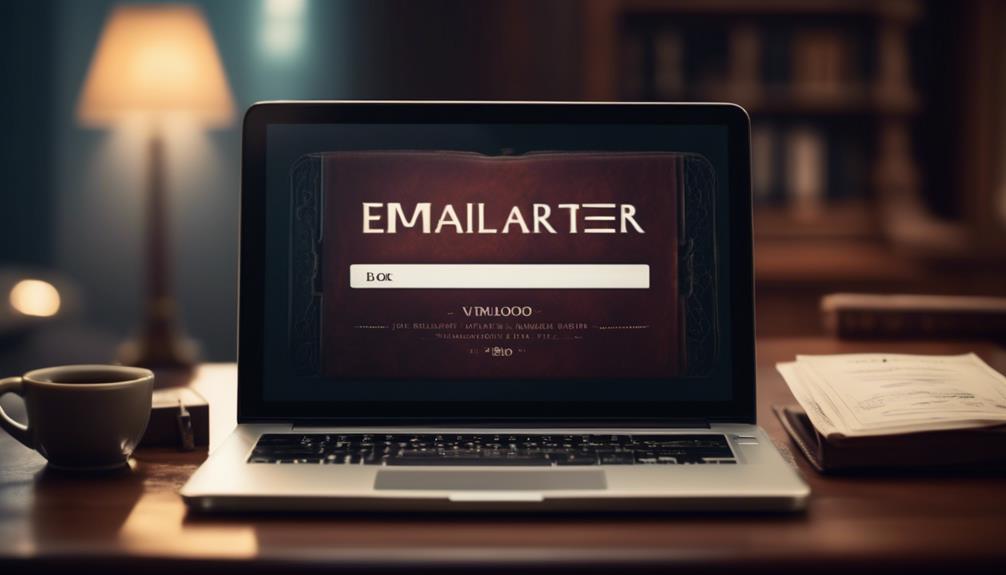As writers, we regularly aim to create connections between the narratives we craft and the emotions of our audience, yet discovering those links can prove to be a challenging endeavor.
Enter email marketing – a beacon of possibility in the digital landscape. The ability to directly engage with our audience, share our work, and cultivate a community of readers holds tremendous potential.
But how exactly can we harness the power of email marketing to propel our writing careers forward?
Join us as we unravel the intricacies of this dynamic tool and discover the strategies that can elevate our authorship to new heights.
Key Takeaways
- Building a mailing list is essential for successful email marketing campaigns.
- Crafting attention-grabbing subject lines and compelling email content is crucial to engage readers.
- Personalizing emails and offering valuable incentives can enhance subscriber engagement.
- Regularly communicating with subscribers and providing valuable content and updates helps maintain a strong relationship.
Email Marketing Vocabulary for Authors
Let's dive into the essential vocabulary that authors need to know for successful email marketing.
As authors, understanding the nuances of email marketing can significantly impact the reach and impact of your work.
First, Email Service Providers (ESPs) are the platforms that facilitate email marketing campaigns.
When building your mailing list, it's crucial to attract and retain engaged email subscribers who are genuinely interested in your content.
Crafting an attention-grabbing subject line is an art form in itself, as it's the first thing your audience sees.
The email content should be compelling, valuable, and relevant to your readers.
A welcome email sets the tone for your relationship with new subscribers, making it a critical initial interaction.
Additionally, offering a lead magnet—a free resource or incentive—can entice visitors to join your mailing list.
Understanding these terms and their significance in the realm of email marketing equips authors with the tools to engage and cultivate a dedicated readership.
Email Marketing Must-Haves to Get Started

As we progress into the realm of email marketing must-haves for authors, it's essential to equip ourselves with the foundational tools and strategies necessary for building and maintaining a dedicated readership.
Authors need to start by utilizing an email marketing software to efficiently manage and send emails. Crafting compelling subject lines is crucial for grabbing readers' attention, and personalizing emails can significantly enhance engagement. Offering a valuable incentive, such as a free book or exclusive content, can encourage readers to subscribe to your email list.
Building and maintaining an email list is a fundamental step. Authors need to regularly communicate with their subscribers, providing them with valuable content and updates. Segmenting the email list based on readers' preferences and behavior allows for the delivery of targeted and personalized content, resulting in higher engagement and conversion rates.
Additionally, authors need to pay close attention to their email campaigns' performance and unsubscribe rate to refine their strategies continuously.
This guide to email marketing provides authors with essential marketing tips and must-haves to kickstart their email marketing journey, ultimately fostering a strong and loyal readership.
Types of Email Marketing Campaigns for Authors
Exploring various email marketing campaigns allows authors to effectively engage with readers and strategically promote their literary works. Newsletters are an essential tool for keeping readers updated on new releases, author events, and other exciting updates.
Lead-nurturing emails are designed to build trust and convert new subscribers into book buyers by providing valuable content and insights into the author's work.
Promotional campaigns are focused on selling specific products, such as new book releases, and can be highly effective in driving sales.
Surveys are a great way to gather feedback and drive reader engagement, allowing authors to tailor their content to better serve their audience.
List growth strategies are crucial for expanding and growing the email subscriber list, ensuring that the author's reach continues to expand.
Understanding these different types of email marketing campaigns can empower Indie Authors to connect with their audience, build a loyal fan base, and ultimately sell more books.
By leveraging these strategies, authors can create a comprehensive email marketing plan that aligns with their goals and resonates with their audience.
Whether it's through a free account or advanced mailing list management, mastering these campaigns is an essential part of promoting literary works effectively.
Email Marketing Tips for Authors

After exploring the diverse types of email marketing campaigns for authors, it's essential to delve into practical email marketing tips that can elevate an author's promotional efforts and reader engagement.
- Craft Compelling Subject Lines: Good email subject lines are crucial for high open rates. They should be attention-grabbing and relevant to the content of the email.
- Personalize Your Emails: Understanding email personalization is key. Addressing readers by their names and segmenting your list for authors based on their preferences can encourage readers to engage with your content.
- Provide Valuable Content: Effective email marketing for authors involves providing valuable content that resonates with your audience. Share sneak peeks, exclusive content, or insights about your next book.
- Call-to-Action (CTA): A clear and compelling CTA can help authors drive reader engagement. Whether it's to join your list, participate in a survey, or pre-order your next book, a well-crafted CTA can make a difference.
- Monitor and Adapt: Regularly monitor email analytics to understand what works best for your audience. This data can help authors refine their email marketing strategy for better results.
Email Copywriting Tips for Authors
Crafting compelling email copy is essential for authors to captivate their readers and drive meaningful engagement with their content. When it comes to email copywriting, there are several best practices that authors can implement to effectively connect with their audience and boost book sales. Personalization is key; addressing subscribers by their names and tailoring content to their interests can significantly enhance the impact of the email. Moreover, using enticing subject lines and lead magnets like free chapters or exclusive content can incentivize email sign-ups and improve open rates. Additionally, creating a welcome sequence and utilizing automation sequences to nurture and retain subscribers can help in providing ongoing value and building trust with the audience. It's also crucial to monitor email analytics to track performance and optimize future campaigns. Below, we've outlined some essential email copywriting tips for authors:
| Email Copywriting Tips | Description |
|---|---|
| Craft Compelling Subject Lines | Engage readers and increase open rates |
| Personalize Emails | Build a connection with subscribers |
| Use Lead Magnets | Incentivize email sign-ups with exclusive content |
– How Can Authors Benefit from Using Email Marketing Strategies?
Authors can benefit greatly from implementing effective email marketing strategies for publishers. By creating a direct line of communication with their audience, authors can promote book releases, build relationships with readers, and increase book sales. Email marketing allows for targeted promotions and personalized interactions, ultimately boosting an author’s visibility and success.
Frequently Asked Questions
What Is Email Marketing for Authors?
Email marketing for authors involves directly engaging with our audience and maintaining control over our communication. It's a cost-effective way to reach a wide range of readers and boost book sales.
We can utilize various email campaigns like lead nurturing and promotional emails. To be effective, we need to offer valuable content, personalize our emails, and optimize campaigns for better results.
Is Mailchimp Good for Authors?
Yes, Mailchimp is good for authors. It offers a free account for up to 2,000 contacts, making it cost-effective.
We can create engaging newsletters, promotional emails, and automated campaigns to connect with our readers. Mailchimp's features like segmentation, tagging, and automation help us tailor our email marketing strategies.
Plus, its analytics and reporting tools let's track the performance of our email campaigns and make data-driven decisions.
What Is a Good Email Address for an Author?
When choosing an email address, we should aim for professionalism and brand reflection. Including the author's name or book title enhances recognition, while a custom domain email adds to our credibility.
We must avoid generic or unprofessional addresses to maintain a good image. This not only builds trust but also helps us stand out in the competitive world of authorship.
How Do I Grow My Author Email List?
We grow our email list by offering valuable lead magnets, like free chapters or books, to encourage subscriptions. We utilize social media and cross-promotion with other authors to attract more subscribers.
We create targeted and personalized email campaigns, such as newsletters and promotional emails. Regular communication with our email list maintains engagement and offers exclusive content and promotions.
Choosing the right email marketing service provider helps us manage and send our campaigns effectively.
Conclusion
In conclusion, email marketing is essential for authors to connect with their readers and promote their books effectively.
Did you know that email marketing has an average ROI of $42 for every $1 spent? It's a powerful tool that allows authors to engage with their audience, gather feedback, and increase book sales.
By mastering email marketing vocabulary, choosing the right software, and implementing effective strategies, authors can build a strong platform and achieve success in the competitive book market.









